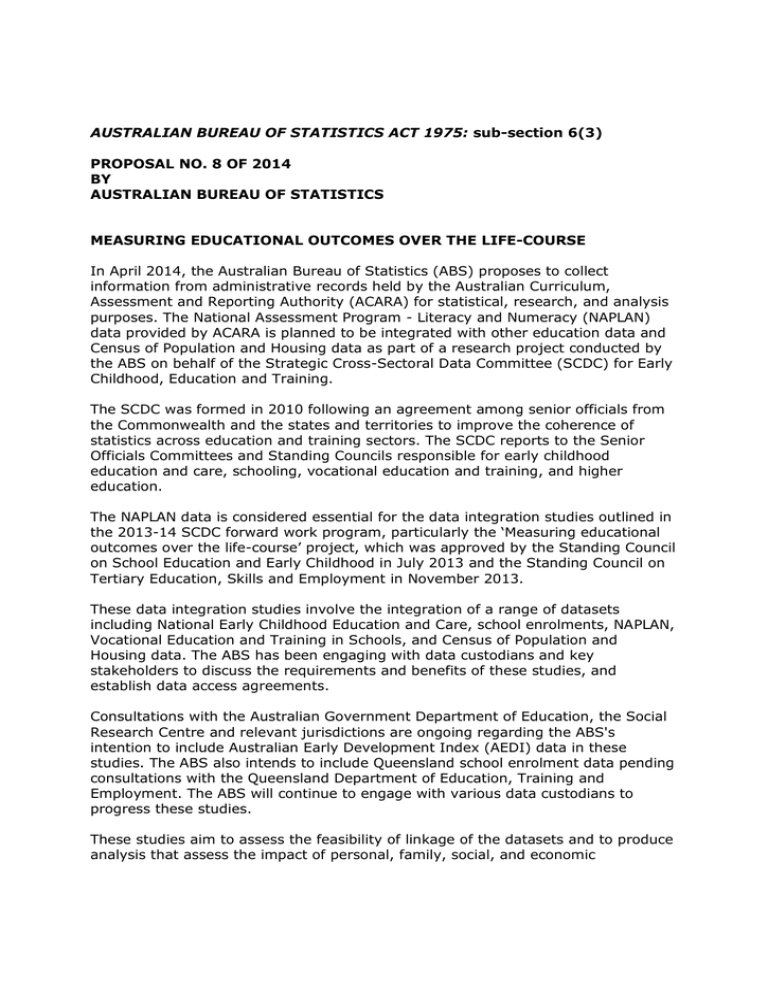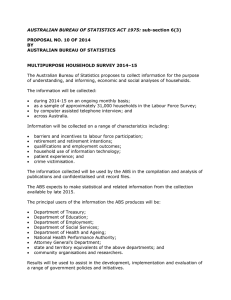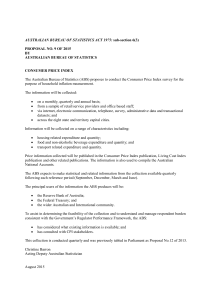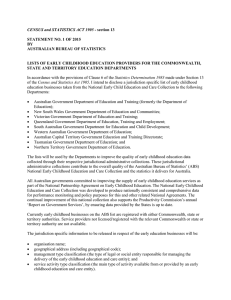AUSTRALIAN BUREAU OF STATISTICS ACT 1975: PROPOSAL NO. 8 OF 2014 BY
advertisement

AUSTRALIAN BUREAU OF STATISTICS ACT 1975: sub-section 6(3) PROPOSAL NO. 8 OF 2014 BY AUSTRALIAN BUREAU OF STATISTICS MEASURING EDUCATIONAL OUTCOMES OVER THE LIFE-COURSE In April 2014, the Australian Bureau of Statistics (ABS) proposes to collect information from administrative records held by the Australian Curriculum, Assessment and Reporting Authority (ACARA) for statistical, research, and analysis purposes. The National Assessment Program - Literacy and Numeracy (NAPLAN) data provided by ACARA is planned to be integrated with other education data and Census of Population and Housing data as part of a research project conducted by the ABS on behalf of the Strategic Cross-Sectoral Data Committee (SCDC) for Early Childhood, Education and Training. The SCDC was formed in 2010 following an agreement among senior officials from the Commonwealth and the states and territories to improve the coherence of statistics across education and training sectors. The SCDC reports to the Senior Officials Committees and Standing Councils responsible for early childhood education and care, schooling, vocational education and training, and higher education. The NAPLAN data is considered essential for the data integration studies outlined in the 2013-14 SCDC forward work program, particularly the ‘Measuring educational outcomes over the life-course’ project, which was approved by the Standing Council on School Education and Early Childhood in July 2013 and the Standing Council on Tertiary Education, Skills and Employment in November 2013. These data integration studies involve the integration of a range of datasets including National Early Childhood Education and Care, school enrolments, NAPLAN, Vocational Education and Training in Schools, and Census of Population and Housing data. The ABS has been engaging with data custodians and key stakeholders to discuss the requirements and benefits of these studies, and establish data access agreements. Consultations with the Australian Government Department of Education, the Social Research Centre and relevant jurisdictions are ongoing regarding the ABS's intention to include Australian Early Development Index (AEDI) data in these studies. The ABS also intends to include Queensland school enrolment data pending consultations with the Queensland Department of Education, Training and Employment. The ABS will continue to engage with various data custodians to progress these studies. These studies aim to assess the feasibility of linkage of the datasets and to produce analysis that assess the impact of personal, family, social, and economic characteristics on school achievement over time. The analysis will pay particular attention to Aboriginal and Torres Strait Islander children, children with disability, and children from disadvantaged backgrounds. Ultimately, these studies aim to provide the foundations for evidence based decision making for improved educational outcomes. The ABS plans to release publically available reports, containing confidentialised aggregate data and analytical outputs in 2014. This release will also contain information on the methodology used to undertake the linkage. The key audience for the outputs are the range of stakeholders involved with education and training information in Australia, particularly state and territory education departments, Commonwealth data agencies, researchers and data analysts. However, it is anticipated that a variety of parties with interests in education, training, data and performance monitoring, and data integration will find value in the report. The ABS will continue to work closely with a range of stakeholders (including data custodians and governance bodies) to facilitate the data collection process and/or ensure the analytical outputs meet the needs of stakeholders. Jonathan Palmer Acting Australian Statistician March 2014


